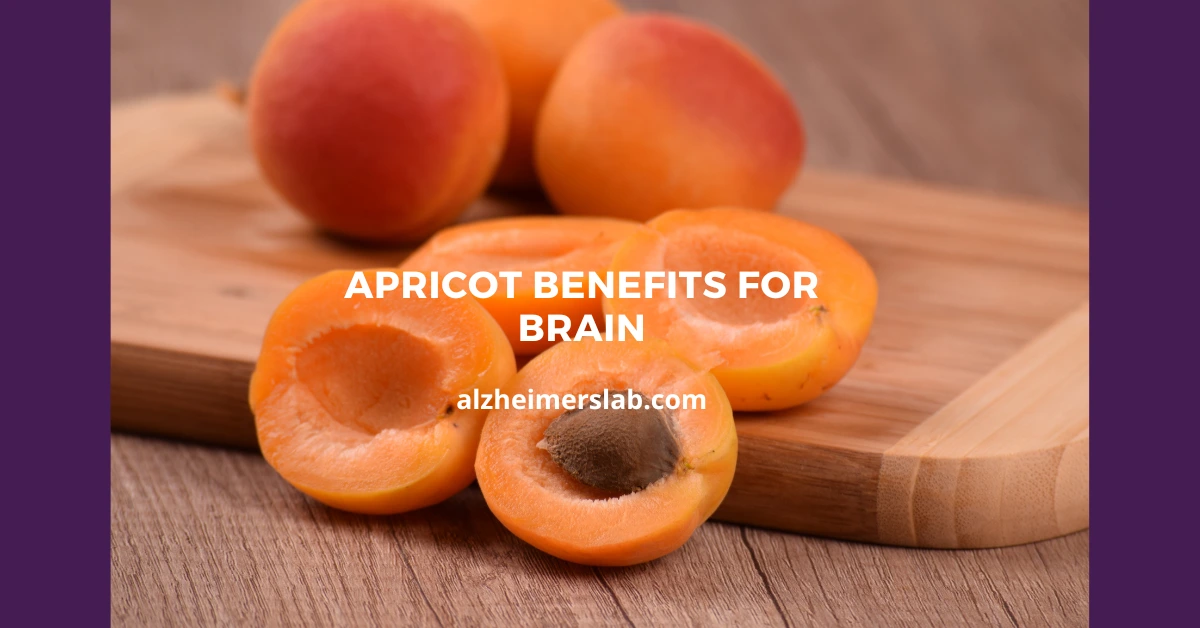Apricot Benefits for Brain: Boosting Cognitive Function and More
Apricots are delicious and nutritious fruit that offer numerous health benefits, including those for the brain. With their high levels of vitamins, antioxidants, and other essential nutrients, apricots can help improve cognitive function, memory retention, and overall brain health. Let’s explore the benefits of Apricots for brain and how to incorporate them into your diet for optimal results.
Getting to know Apricots

Apricots are small, golden-orange fruits that are packed with nutrients that are essential for a healthy body and brain. They belong to the stone fruit family, which includes peaches, plums, and cherries. Apricots are known for their sweet and tangy taste and are often used in desserts, jams, and other culinary creations.
Apricots are rich in vitamins A, C, and E, as well as potassium, iron, and fiber. They also contain antioxidants such as beta-carotene and lycopene, which help protect the body and brain from damage caused by free radicals. These antioxidants also have anti-inflammatory properties that can reduce inflammation in the brain, which is a contributing factor to cognitive decline.
Apricot Benefits for Brain
Apricots have been shown to have several benefits for brain health. Here are some of the Apricot benefits for brain:
Improving Memory Retention
Apricots are rich in antioxidants, including flavonoids, which have been shown to improve memory retention. In a study published by the Tabriz University of Medical Sciences, researchers found that consuming apricots increased the levels of antioxidants in the brain, which improved memory function. The study concluded that consuming apricots regularly can help prevent age-related memory decline.
Enhancing Cognitive Function
Apricots contain choline, a nutrient that is essential for the production of acetylcholine, a neurotransmitter that is critical for cognitive function. Acetylcholine is involved in memory, learning, and decision-making. Consuming apricots regularly can help improve cognitive function by increasing the production of acetylcholine in the brain.
Protecting Against Neurodegenerative Diseases
Apricots are rich in antioxidants, including vitamin E, which has been shown to protect the brain from neurodegenerative diseases such as Alzheimer’s and Parkinson’s. Vitamin E acts as a powerful antioxidant, protecting the brain from oxidative stress and inflammation that can lead to cognitive decline.
How to Incorporate Apricots into Your Diet
Incorporating apricots into your diet is easy and can be done in a variety of ways. Here are some suggestions:
Snack on Fresh Apricots
Fresh apricots make a delicious and healthy snack. Simply wash the apricots, cut them in half, and remove the pit. Eat them as is or sprinkle some cinnamon on top for a tasty treat.
Add Dried Apricots to Your Breakfast
Dried apricots can be added to your breakfast in a variety of ways. Chop them up and add them to your oatmeal or yogurt, or mix them with other dried fruits and nuts for a healthy trail mix.
Use Apricots in Baking
Apricots can be used in a variety of baked goods, including cakes, muffins, and bread. Simply chop them up and add them to your favorite recipe for a delicious and nutritious twist.
How many apricots should I eat per day to see cognitive benefits?
Apricots are a tasty and nutritious fruit that can provide numerous health benefits, including improved cognitive function. However, the question of how many apricots one should eat per day to see these benefits is not a straightforward one, as it depends on various factors.
One important consideration is the individual’s overall diet and lifestyle. If someone already consumes a well-balanced and varied diet that includes plenty of other fruits and vegetables, they may not need to eat as many apricots to see cognitive benefits.
On the other hand, if someone’s diet is lacking in nutrients and they don’t consume many other fruits and vegetables, they may need to eat more apricots to see noticeable improvements in cognitive function.
Another factor to consider is the individual’s age and current cognitive function. Older adults or those with cognitive impairments may need to consume more apricots to see benefits compared to younger individuals with normal cognitive functions.
Generally speaking, one to two servings of apricots per day is a good starting point for those looking to see cognitive benefits. A serving size can vary, but typically one serving of apricots is equal to around three to five apricots. It’s important to remember that moderation is key, and consuming too many apricots (or any other food) can have negative health consequences.
Can apricots prevent or cure neurodegenerative diseases?
Apricots are a delicious fruit that is enjoyed by many people around the world. But, can they also have health benefits beyond their taste? Specifically, can apricots help prevent or cure neurodegenerative diseases?
Neurodegenerative diseases are a group of disorders that affect the neurons in the brain and spinal cord, leading to progressive decline in function. Some examples of neurodegenerative diseases include Alzheimer’s, Parkinson’s, and Huntington’s disease. These diseases are currently incurable, so finding ways to prevent or slow down their progression is an important area of research.
Apricots are a good source of nutrients like vitamin C, beta-carotene, and potassium. They also contain compounds like quercetin and catechins, which have antioxidant properties. Antioxidants help to protect cells from damage caused by free radicals, which can contribute to the development of neurodegenerative diseases.
One study published by the Università degli Studi di Sassari found that a compound called caffeoylquinic acid, which is found in apricots, could protect neurons from damage caused by oxidative stress. This suggests that consuming apricots could potentially help prevent or slow down the progression of neurodegenerative diseases.
However, it’s important to note that there is currently no definitive evidence that apricots can cure or prevent neurodegenerative diseases. More research is needed to fully understand the potential benefits of consuming apricots and their compounds for neurological health.
Are there any side effects of consuming too many apricots?
Consuming too many apricots can have some negative side effects on your health. Apricots are a good source of vitamins, minerals, and fiber, but they also contain high amounts of natural sugars and carbohydrates.
One potential side effect of consuming too many apricots is digestive issues. Eating too many apricots at once can lead to diarrhea, bloating, and stomach cramps. This is because the fruit contains sorbitol, a sugar alcohol that can cause gastrointestinal distress if consumed in large quantities.
Another potential side effect of consuming too many apricots is an increase in blood sugar levels. Apricots are high in natural sugars and carbohydrates, which can cause blood sugar levels to spike. This can be particularly dangerous for people with diabetes, as it can lead to hyperglycemia and other health complications.
Lastly, consuming too many apricots can also lead to vitamin A toxicity. Apricots are rich in vitamin A, which is essential for maintaining healthy vision, skin, and immune system function. However, consuming excessive amounts of vitamin A can lead to toxicity, which can cause a range of symptoms such as nausea, vomiting, and headaches.
Are dried apricots as beneficial for brain health as fresh apricots?

Dried apricots are a popular snack among health-conscious individuals, and they are often touted as a great source of nutrients. However, some people may wonder if dried apricots are as beneficial for brain health as their fresh counterparts.
Firstly, it’s important to note that fresh and dried apricots contain many of the same nutrients that are good for brain health. Both are rich in vitamin C, which is an antioxidant that can help protect brain cells from damage caused by free radicals.
Additionally, both fresh and dried apricots contain potassium, which is important for maintaining healthy blood pressure and reducing the risk of stroke.
However, there are some differences between fresh and dried apricots when it comes to their nutritional content. For example, dried apricots are higher in fiber than fresh apricots, which can be beneficial for overall health but may not have a specific impact on brain health.
On the other hand, fresh apricots are a better source of vitamin A, which is important for eye health but also plays a role in maintaining cognitive function.
It’s also worth noting that dried apricots are more calorie-dense than fresh apricots, which means that you need to be mindful of portion sizes if you’re trying to maintain a healthy weight. Additionally, some dried apricots may contain added sugars or other ingredients that can be detrimental to overall health if consumed in excess.
Conclusion
Apricots have many benefits for the brain due to their high nutrient content, including vitamins A and C, potassium, and antioxidants. These nutrients can help improve cognitive function, and memory, and protect against age-related cognitive decline. Eating apricots as part of a healthy diet can be a delicious way to support brain health.
But the question remains, how can we incorporate more apricots into our diet? Maybe trying out some new recipes like apricot smoothies, apricot-glazed chicken, or simply adding dried apricots to your oatmeal or yogurt could be a good start. What are your favorite ways to enjoy apricots? Let me know in the comments below.

